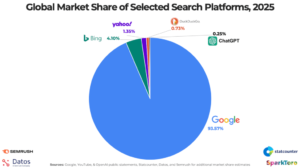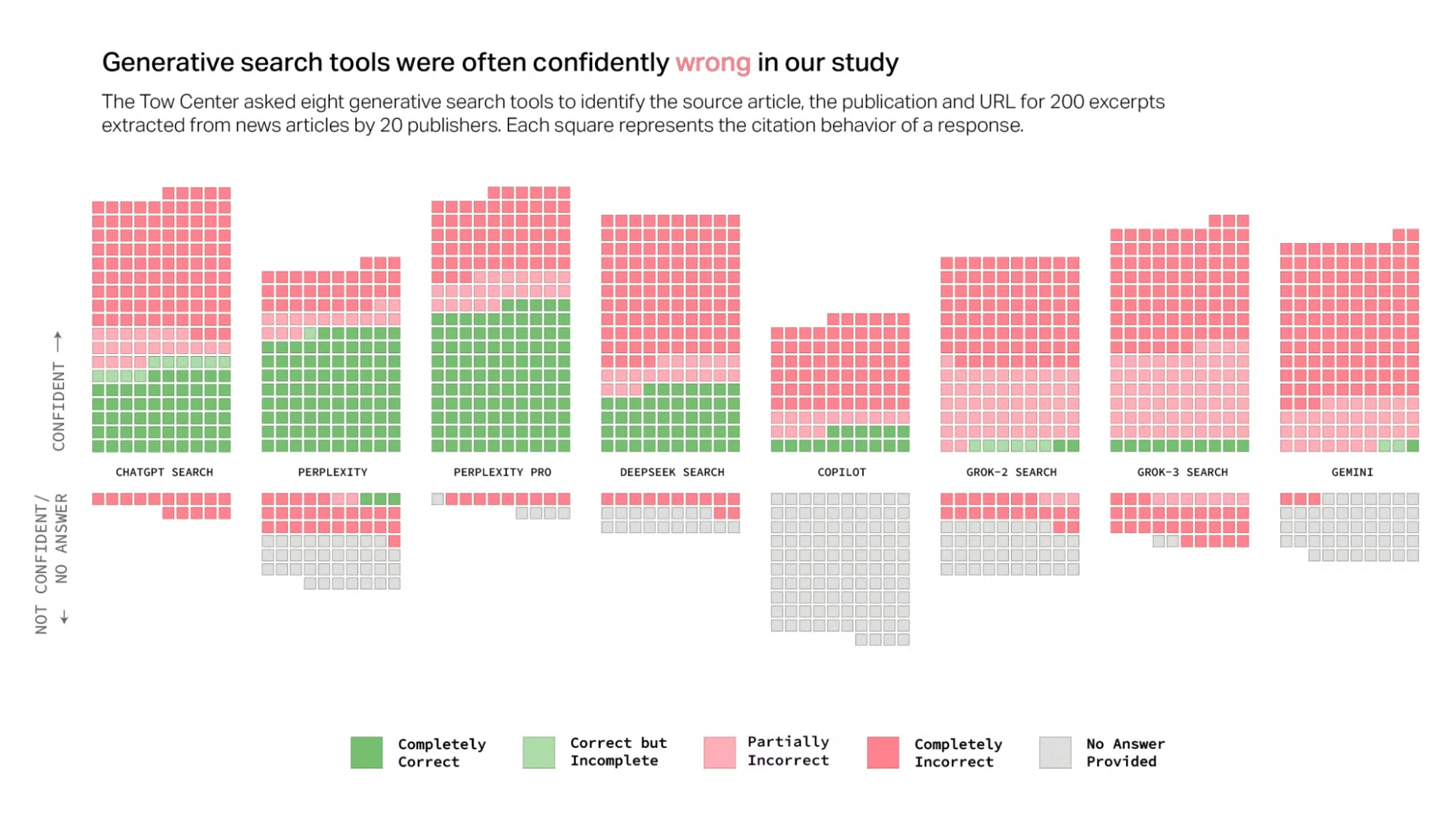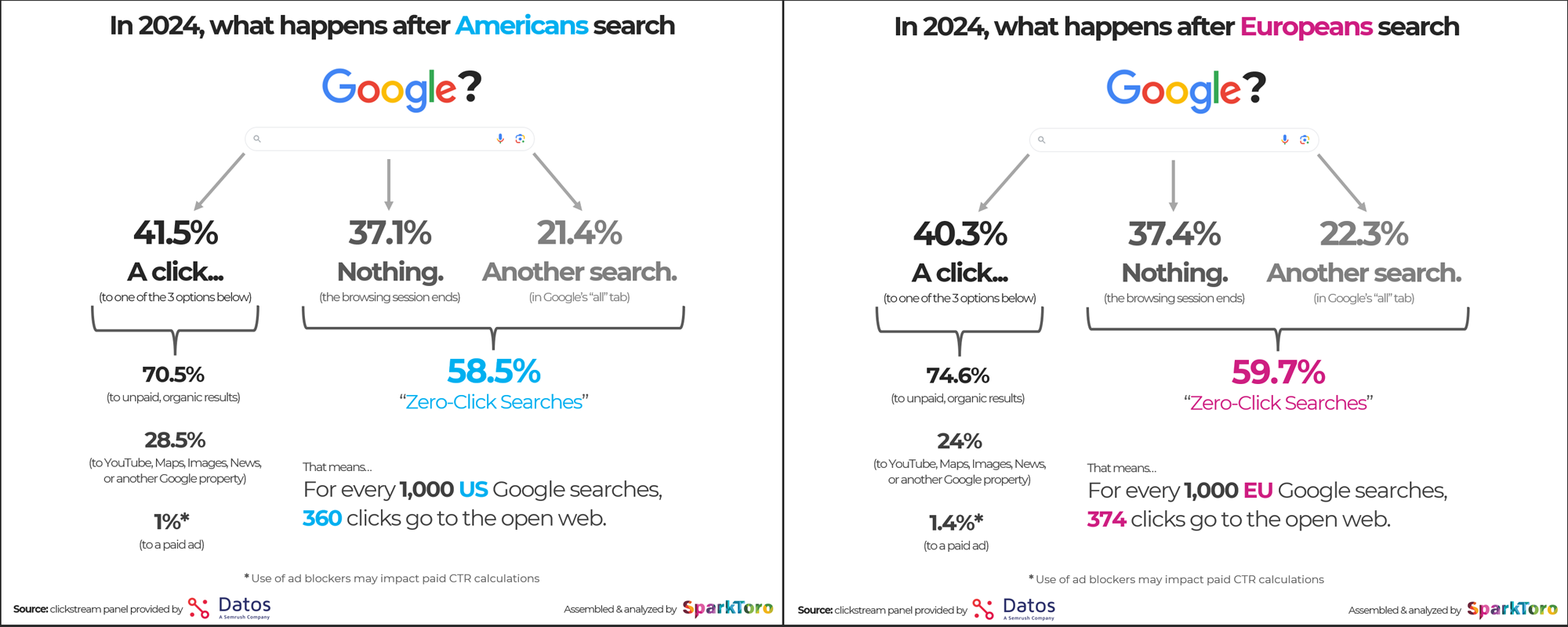Despite all the hype, AI search tools like Perplexity and ChatGPT account for less than 1% of global search traffic. Google still processes 373 times more searches than ChatGPT daily. The AI search traffic revolution isn’t here yet.
Let’s get real about AI search adoption. If you’ve been following tech news, you’d think ChatGPT search and Perplexity were about to dethrone Google any day now. Venture capitalists are throwing billions at AI search startups. Media outlets breathlessly report on the “search revolution.” But here’s the thing nobody wants to talk about: AI search is still a rounding error in the grand scheme of search traffic.
So, let’s break it down: the why, the how, and who stands to gain from this narrative gap between hype and reality.
 The numbers don’t lie (even if the headlines do).
The numbers don’t lie (even if the headlines do).
Here’s what the data actually shows. Google maintains a stranglehold on search with 89.66% of global market share as of 2025. That’s not a typo. Despite all the AI search excitement, Google processes 14 billion searches daily. Meanwhile, ChatGPT handles about 37.5 million prompts per day.
Do the maths: Google processes 373 times more searches than ChatGPT. That’s not competition – that’s a rounding error with a really good PR team.
But wait, there’s more. According to recent traffic analysis, AI search tools represent only 0.1% to 0.25% of total website traffic. The SparkToro 2024 Zero-Click Search Study found that AI search traffic collectively accounts for less than 1% of all search activity. Even if you’re generous and include all AI chatbots, they capture just 2.96% of total search engine traffic.
Perplexity, often held up as the poster child for AI search innovation, has approximately 15 million monthly active users. That sounds impressive until you realise Google serves billions of users daily. Perplexity’s daily visitors hover around 2 million globally—literally less than 0.01% of Google’s daily search volume.
 The AI user retention reality check
The AI user retention reality check
“But users love AI search when they try it!” Sure, let’s examine that claim. According to SparkToro’s research, 21% of US web users visited ChatGPT at least once per month in Q4 2024. That might sound like decent adoption until you dig deeper.
However, here’s the kicker: 99.8% of those ChatGPT users also used Google. Read that again. Nearly every person who uses AI search tools still goes back to Google for their regular searches. Despite all the hype, the vast majority of web users, 79%, haven’t even tried ChatGPT once a month.
This isn’t replacement behaviour, it’s supplementary usage. The numbers tell the story: Google processes 14 billion searches daily while ChatGPT handles just 37.5 million prompts per day. We’re talking about fundamentally different usage patterns, not a paradigm shift. Other AI platforms like Perplexity, Claude, Copilot, and Gemini each account for less than 5% user adoption, according to SparkToro’s data.
 The conversion confusion
The conversion confusion
AI search proponents love to point out that AI search visitors convert 4.4 times better than traditional organic search visitors. That’s technically true, but it’s also misleading.
Think about it: if you’re using Perplexity to research “best project management software for remote teams,” you’re already deep in the buying process. Of course you’re more likely to convert than someone Googling “weather tomorrow.” AI search users arrive more decision-ready because they’ve already invested significant time in their research process.
It’s like saying luxury car dealerships have higher conversion rates than McDonald’s. Well, yeah—but McDonald’s serves infinitely more customers.
 The demographic disconnect
The demographic disconnect
Who actually uses AI search? The data reveals a narrow demographic slice: 70% male, predominantly younger users, heavily skewed toward students and tech professionals. ChatGPT users are primarily aged 18-34, with students representing the largest occupational group.
This isn’t mainstream adoption—it’s early adopter behaviour concentrated in specific demographics. Meanwhile, Google serves everyone from teenagers looking for memes to grandparents checking the weather. Only 30% of Baby Boomers show positive attitudes toward AI search, and even among Gen Z, excitement levels hover around 57-62%.
If you use social media only then the chances are that your users/customers will already know of you, where as website SEO is a targeted approach because those potential new customers are already searching what you sell or do, but don’t yet know of you.
 The Enterprise reality
The Enterprise reality
The business world tells a similar story. While 92% of Fortune 500 companies have integrated ChatGPT in some capacity, most remain in pilot phases. Only 26% of companies have developed the necessary capabilities to move beyond AI proofs of concept. A staggering 74% have yet to show tangible value from AI use.
McKinsey research found that only 1% of company executives describe their AI rollouts as “mature.” That’s not exactly the enterprise transformation we’ve been promised.
 The accuracy problem of Perplexity, ChatGPT & other LLM
The accuracy problem of Perplexity, ChatGPT & other LLM
Here’s where things get uncomfortable for AI search advocates. Studies consistently show that AI search engines are “confidently wrong” over 60% of the time when citing news sources (AI hallucination). ChatGPT has knowledge cut-offs (GPT 3.5 only knows information up to September 2021), usage caps, and context limitations that make it unsuitable for many search tasks.
Perplexity faces ongoing legal challenges from publishers over content usage and has been criticised for not respecting robots.txt standards. These aren’t minor technical issues—they’re fundamental problems that limit mainstream adoption.
 The zero-click connection
The zero-click connection
The most interesting development isn’t AI search taking traffic from Google—it’s both AI search and Google’s own AI features reducing clicks to external websites. The SparkToro study found that 58.5% of US Google searches result in zero clicks. Google’s AI Overviews appear in 47% of searches, taking up to 48% of mobile screen space.
This means the real impact of AI on search isn’t ChatGPT or Perplexity stealing Google’s lunch—it’s Google using AI to keep users on its own platform. Publishers could lose up to 25% of traffic due to AI Overviews, not because users are switching to alternative platforms.
 The investment vs. reality gap
The investment vs. reality gap
The AI search sector has attracted massive investment. OpenAI expects $11.6 billion in annual revenue by 2025. Perplexity AI projected $40 million revenue in 2024. These numbers fuel the hype machine and create pressure to present AI search as more revolutionary than it actually is.
But here’s the reality check: OpenAI spends $5 billion annually to run ChatGPT while not yet being profitable. Perplexity is also loss-making, but has a valuation 400 times greater than last year’s revenue. The unit economics don’t currently support the massive scale that would threaten Google’s dominance.
 What this means for the future
What this means for the future
Don’t mistake this analysis for AI search scepticism. These tools are genuinely useful for specific tasks and will likely grow their user base. The technology is improving, and younger demographics show higher adoption rates.
However, the timeline for meaningful disruption is much longer than the hype suggests. Industry experts predict 2026-2027 as a more realistic timeframe for substantial AI search adoption, not the immediate transformation that venture capitalists and tech journalists have been selling.
The most likely scenario isn’t AI search replacing Google—it’s Google successfully integrating AI features while maintaining its search dominance. The company has already launched AI Overviews for 1.5 billion users monthly and plans $75 billion in capital expenditure for 2025, largely focused on AI infrastructure.
The bottom line: AI search with Perplexity & ChatGPT
AI search represents genuine innovation in specific use cases, but it’s not revolutionizing search behaviour yet. The numbers don’t support the narrative. Google processes hundreds of times more searches than all AI search tools combined. Nearly every AI search user still relies on traditional search engines for most queries.
If something sounds too good to be true – like AI search immediately disrupting a market dominated by one of the world’s most successful companies, ask yourself why the actual usage data tells a different story.
The AI search revolution isn’t here yet. It might arrive eventually, but right now, it’s still a very expensive, very hyped rounding error.
The next time you see a headline about AI search changing everything, remember: Google still owns search, and the data proves it.
Sources:
- SparkToro: 2024 Zero-Click Search Study
- SparkToro: AI Not Disrupting Search (Yet)
- Search Engine Land: Google 5 Trillion Searches Per Year
- Seer Interactive: Why 2020’s SEO KPIs Don’t Work Anymore
- SparkToro: Traffic is Down, Revenue is Up
- SparkToro: Google vs. ChatGPT Search Volumes
- AHrefs: AI makes up 0.1% of traffic
- SEMrush: ChatGPT Search Insights








